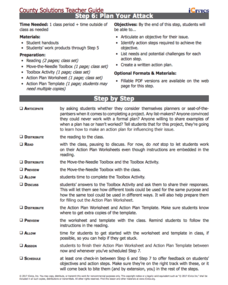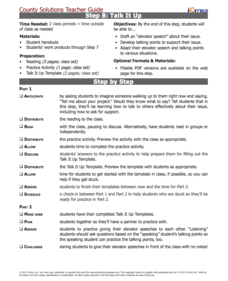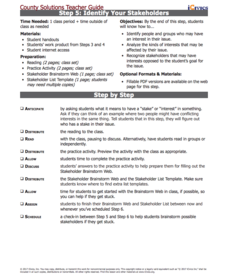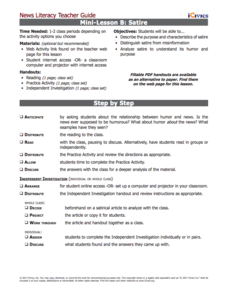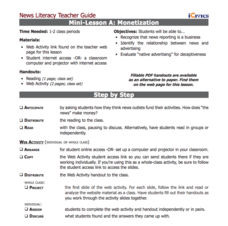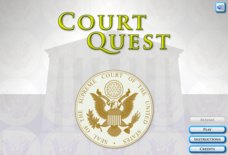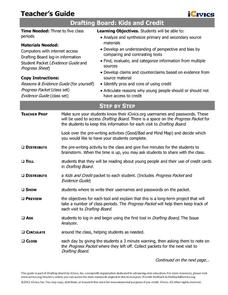iCivics
Step 3: Become an Expert
Have you ever been called an expert before? Pupils analyze how to break down sources of information using group work and individual skills. They begin to understand the tools of becoming an expert on a topic by using subtopics and...
iCivics
Step Three: Who You Gonna Call?
Problem solving is an essential skill everyone must master. The resource instructs pupils how to analyze different scenarios and decide the best way to solve many different problems that take place in communities. Scholars read, discuss,...
iCivics
Step 6: Plan Your Attack
Lights, camera, ACTION! Pupils learn what it takes to set up an action plan to achieve a goal in the sixth installment of a 10-part County Solutions - High School series. They research, analyze, and work together to create a plan of...
iCivics
Step 9: Grab People’s Attention
Attention! Attention! Scholars investigate the concept of attention-grabbers in advertising a product or a cause. They use the ninth installment of a 10-part County Solutions - High School series to analyze t-shirts, bumper stickers,...
iCivics
Step 8: Talk It Up
You have 30 seconds to sell your idea ... go! Scholars master the art of the elevator pitch in the eighth step of a 10-part series. They use research, practice, and step-by-step planning to gain a better understanding of the method....
iCivics
Step 7: Fill the Holes
It's time to communicate without using emojis or hashtags! In the seventh step of a 10-part County Solutions - High School unit scholars analyze professional communication when accomplishing a goal. They use examples, research, and data...
iCivics
Step 5: Identify Your Stakeholders
Have you ever had a goal, but needed help achieving it? Scholars analyze the purpose of stakeholders in the fifth installment of a 10-part County Solutions - High School series. They investigate finances, personal concerns, geography,...
iCivics
Step 4: Consider the Context
Have you ever noticed how deep the roots of a tree or plant stretch? Scholars analyze the context of an issue and the root causes that go to the base of the problem. The fourth step of a 10-part County Solutions - High School unit shares...
iCivics
Step 2: Find What You Need
Have you ever searched for something on the web only to get 50,000 results? Scholars analyze ways to break down an inquiry to get specific results. The second installment of a 10-part County Solutions - High School series researches...
iCivics
Step 1: Change the World?
Want to change the world? Where do you begin? Scholars analyze the steps that must take place to make change in society. The first installment of a 10-part County Solutions - High School series brings the real world to the forefront as...
iCivics
Lesson 3: Bias
How do journalists balance bias and ethical reporting? The final lesson in a series of five from iCivics examines the different types of bias and how they affect the news we read. Young reporters take to the Internet to find examples of...
iCivics
Mini-Lesson B: Satire
Hey, what's so funny? Explore the use of satire in a variety of media with a hands-on instructional activity. Fourth in a five-part journalism series from iCivics, the activity introduces satirical language in print and online. Pupils...
iCivics
Lesson 2: Misinformation
Fake news is a hot topic right now ... but what is it? Intrepid young investigators track down the facts that separate journalistic mistakes and misinformation through reading, research, and discussion. Part three in a five-lesson series...
iCivics
Mini Lesson A: Monetization
Advertising is everywhere! Does your class know that their attention span is for sale, even when they're watching a simple news story? The second installment in a five-part series from iCivics examines the relationship between news...
iCivics
Lesson 1: Journalism
Extra! Extra! Do your pupils know what it takes to be a good journalist? Young news hounds explore the world of journalism through a series of activities that focus on ethical reporting. Learners read, evaluate, and investigate popular...
iCivics
Constitution Day
Celebrate Constitution Day, September 17, with an activity that asks class members to identify the responsibilities of the three branches of the U.S. government.
iCivics
Power Play
Should states or the federal government have more power? With this fantastic online interactive, your pupils will be charged with the task of identifying arguments that support either federal or state power.
iCivics
Represent Me!
Your class members will take on the roles of legislators and work to serve their constituents in a fun online video game. They will practice sorting and approving bills based on the wants of the people they represent, and understand the...
iCivics
Court Quest
Introduce your learners to the federal and state court systems with a fun, interactive online video game! After reading sample cases, class members identify to which court the case should be assigned and gain a greater understanding...
iCivics
We the Jury
Learners take on the roles of jurors in a civil case to evaluate evidence and determine a verdict in this engaging online interactive experience.
iCivics
Drafting Board: Community Service
Should schools impose community service graduation requirements? In the final lesson of the Drafting Board series, learners solidify their practice of crafting an argument supported by sound reason and evidence.
iCivics
Drafting Board: Electoral College
Should the president of the United States be voted by the Electoral College or the popular vote? Your young historians will consider the pros and cons of the Electoral College, and make an argument using reasons and evidence provided in...
iCivics
Drafting Board: Kids and Credit
Should kids under the age of 18 be given access to credit cards? Learners identify pros and cons of using credit, develop claims based on evidence, and finally argue reasons for or against credit for minors.
iCivics
Drafting Board: Military Intervention
Should countries use their militaries to stop humanitarian crises in other countries? Learners make claims, organize their reasoning, and provide evidence for their arguments with this rich resource.




